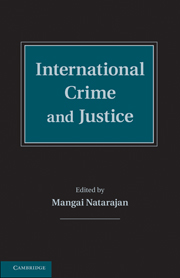Book contents
- Frontmatter
- Contents
- List of Figures
- List of Tables
- List of Contributors
- Foreword
- Preface
- Introduction
- Part I International Criminology
- Part II Law, Punishment, and Crime Control Philosophies of the World
- Part III Transnational Crime
- Part IV Organized Crime and Terrorism
- 30 Transnational Organized Crime
- 31 The Rise of Balkan Organized Crime
- 32 Russian Organized Crime
- 33 The Italian Mafia
- 34 Extortion and Organized Crime
- 35 Organized Crime in Asia
- 36 Drug Cartels
- 37 The International Implications of Domestic Terrorism in the United States
- 38 Terrorism
- Part V International crime
- Part VI Delivering International Justice
- Part VII International Cooperation and Criminal Justice
- Part VIII International Research and Crime Statistics
- Part IX International research resources
- World Map
- Index
- References
36 - Drug Cartels
Neither Holy, Nor Roman, Nor an Empire
Published online by Cambridge University Press: 05 October 2014
- Frontmatter
- Contents
- List of Figures
- List of Tables
- List of Contributors
- Foreword
- Preface
- Introduction
- Part I International Criminology
- Part II Law, Punishment, and Crime Control Philosophies of the World
- Part III Transnational Crime
- Part IV Organized Crime and Terrorism
- 30 Transnational Organized Crime
- 31 The Rise of Balkan Organized Crime
- 32 Russian Organized Crime
- 33 The Italian Mafia
- 34 Extortion and Organized Crime
- 35 Organized Crime in Asia
- 36 Drug Cartels
- 37 The International Implications of Domestic Terrorism in the United States
- 38 Terrorism
- Part V International crime
- Part VI Delivering International Justice
- Part VII International Cooperation and Criminal Justice
- Part VIII International Research and Crime Statistics
- Part IX International research resources
- World Map
- Index
- References
Summary
In the 1980s the term “cartel” became shorthand for powerful Colombian criminal syndicates that exported narcotics as a result of the way that it dovetailed with the wider political discourse of the war on drugs (Kenney, 2007: 235–34). The two most prominent groups were based in the cities of Medellin and Cali. The Colombian groups, which achieved immense notoriety and political power, became the targets of vigorous repression efforts on the part of the U.S. and Colombian governments that resulted in their destruction during the 1990s. These successes have had the effect of decentralizing the Colombian drug trade and shifting control of trafficking in the region to Mexican organizations. I will begin this chapter with a historical and political background of these groups, looking at how they operated, examining them from a theoretical perspective to understand why the term “cartel” is inappropriate, and will conclude with a comparison of Colombian and similarly named Mexican trafficking groups operating today.
BACKGROUND
During the nineteenth century Colombia experienced several civil wars culminating in the Thousand Days War. Conflict again erupted in 1948 with assassination of Jorge Gaitan, the leader of a reformist faction of the Liberal Party (Crandall, 2002: 55; Bowden, 2002: 7–14). His supporters rioted for days and unrest spread to the countryside where an amorphous civil war known as La Violencia erupted. The conflict lasted until 1957 and resulted in the deaths of between one thousand and three hundred thousand Colombians. A pact to end the conflict did not resolve the rancorous national tensions over social justice that motivated many combatants (Crandall, 2002: 57). As a result, in the 1960s a new civil war began between groups influenced by Marxist-Leninism and the government.
- Type
- Chapter
- Information
- International Crime and Justice , pp. 276 - 282Publisher: Cambridge University PressPrint publication year: 2010



